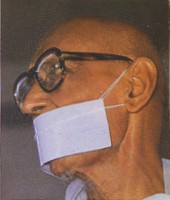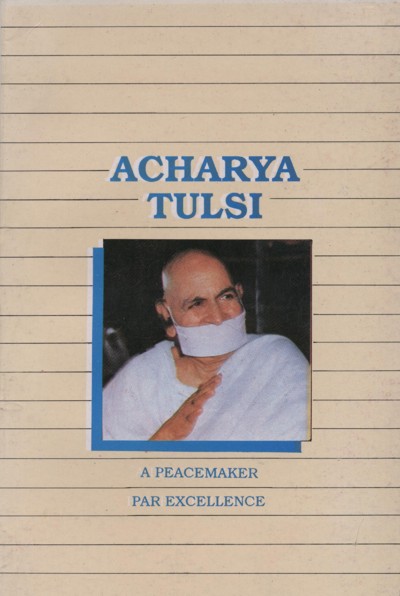It is believed that religion is something that has to do with an individual. But in reality it also concerns society. It may be practised individually but it leaves its effect on society. Acharyashree realized the universal nature of religion and made it a tool to solve social, national and international problems. One can have some idea about it on the basis of some of the important messages and discourses he gave on specific occasions:
'A Message of Peace to a World Full of Unrest'
Occasion: World Congress of Faiths held on 22nd June, 1945 in London to promote peace in the world.-
'Secret of Religion'
Occasion: World Religious Conference held under the chairmanship of Sarojini Naidu on the eve of the Asian Conference on 21st March. 1947. -
'A Religious Message' (Dharm Sandesh)
Occasion: Dharm Parishad (religious conference) organized by Hindi Tatva Gyan Pracharak Samiti, Ahmedabad on 11th July, 1947. -
'An Ideal Republic'
Occasion: Asian Conference held in Delhi on 23rd March, 1947 under the leadership of Pandit Jawaharlal Nehru. -
'Unity of the East and the West'
Ocassion: A Jain Religious Conference held in London. -
'The Path of World Peace'
Occasion: Peace Congress organized at Shantiniketan. -
'Religion is Everything: It is Nothing'
Occasion: Serva Dharma Sammelah (All Religions' Conference) held in January, 1950 in Delhi. -
'Infatuation with Ism'
30th June, 1950 at Bhivani. -
'Non-possession and Plutolatry'
Occasion: Sahitya Goshthi (a seminar on literature) organized on 28th May, 1950 in New Delhi. -
'How can we Put an End to Conflict?'
Occasion: A conference of editors held in New Delhi on 16th May, 1950. -
'A Farewell Message'
Delivered on 8th June, 1950 at Karolbagh on the occasion of his departure from Delhi. -
'Religion and Indian Philosophy'
On the occasion of the Silver Jubilee of the Indian Philosophical Council presided over by Dr. S. Radhakrishnan in Calcutta. -
'A Large Stream of Indian Culture'
Hansi (Haryana), October 1950. -
'Spiritualism: The Basis of a Republic's Success'
Hansi, 28th January, 1951.
'A Message of Peace to a World Full of Unrest' is Acharyash-ree's first message. It received a warm welcome from the world dazed by the ghastly holocaust of the Second World War. It evoked a favourable response both at home and abroad. Mahatma Gandhi wrote notes 'at various places in the margin of a copy of the message. The message was given on June 22, 1945 but was published much later. The delayed publication of the message led Gandhiji to vrite in the margin of the preface, "What made such a message come out so late?" Samyakatva (right faith or knowing things as they are) has been mentioned as one of the ways of bringing about perennial peace in the world. Gandhiji wrote about it on the eleventh page of the booklet: "Was this Samyakatva propagated?" On the 21st page of the booklet a nine-point programme consisting of nine universally recognized basic principles has been suggested as the surest way to bring about a lasting peace in the world. Commenting on it Gandhiji wrote, "I wish all the peoples of the world could follow the path shown by this great man."
Dr. Raymonds F. Piperne of Syracuse University, New York wrote in a letter that he had included the important extracts from Acharya Tulsi's message of peace in the syllabus for his students for a comparative study.
Acharyashree has always been in the forefront of religious harmony. He has met the teachers of all faiths and scholars of eminence. He has exchanged views with them for mutual understanding. He met the Dalai Lama, the spiritual head of the Buddhist religion, in Delhi on the occasion of Buddha Jayanti. An Anuvrat conference was held at the Rashtrapati Bhavan on December 2, 1956. At the end of the programme Acharyashree asked the President, "Has the Dalai Lama, who was scheduled to be here, come?"
President: Do you want to meet him?
Acharyashree: I'd like to meet him if he's already arrived.
President: I'll find out and let you know soon.
After a few minutes the Secretary to the President came with the message that Acharyashree should, reach a suite in the upper storey. On reaching there Acharyashree found Pandit Nehru engaged in conservation with the Dalai Lama and the Panchen Lama in a room. On seeing Acharyashree Pandit Nehru led them up to him and introduced Acharyashree to them with the help of their interpreter. Acharyashree said, "We feel exhilarated at the confluence of the two streams of Shraman Sanskriti, i.e., Buddhism and Jainism." The Lamas also expressed their joy at this unexpected opportunity. Acharyashree asked Pandit Nehru to tell them that the Jain ascetics always travel on foot and that they had travelled about 200 kilometres on foot to be able to reach Delhi from Rajasthan. Pandit Nehru replied that he had just told them all about it.
This brief meeting with the Lamas was an unforgettable experience.
 Yuvacharya Mahaprajna
Yuvacharya Mahaprajna
